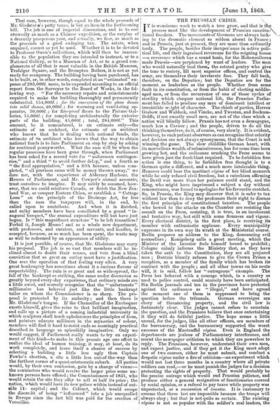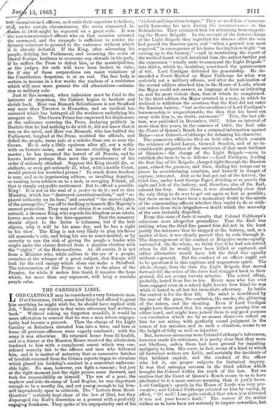THE PRUSSIAN CRISIS.
IT is wearisome work to watch a tree grow, and that is t process most like the development of Prussian constitu- tional freedom. The movements of Germans are always lack- ing in the dramatic element so seldom absent in France ; and in Prussia, just at present, they are more than ordinarily tardy. The people, besides their inexperience in active poli-
tical life, and their ingrained reverence for the reigning house —a reverence which has a sound basis, for the Hohenzollerns made Prussia—are perplexed by want of leaders. The men who would naturally lead them, the estated gentry who give the tone to society, fill most superior offices, and control the army, are themselves their inveterate foes. They fall back, therefore, on the Deputies; but the Deputies are for the moment as leaderless as the people. Whether from some fault in its constitution, or from the habit of electing middle- aged men, or from the occurrence of one of those cycles of sterility which chequer national life, the Prussian Parlia- ment has failed to produce any man of dominant intellect or irresistible weight of character. The chiefs of parties, Herren Grabow and Waldeck, and Vincke, and Twesten, and Bockum- Dolffs, if not exactly small men, are not of the class which a nation will blindly follow. Prussia has not even a demagogue, much less a Cavour ; and the people, driven to do all the thinking themselves, do it, of course, very slowly. It is evident, however, to such patient observers as can recognize that celerity and decision are not always synonymous, that the Court is not winning the game. The slow childlike German heart, with its marvellous wealth of submissiveness, has for some time been growing hot, and the ordinance crushing the Press seems to have given just the fresh blast required. To be forbidden free action is one thing, to be forbidden free thought is to a German quite a different, and a much more intolerable thing. Hanover could bear the martinet regime of her blind monarch while he only refused civil freedom, but a catechism affirming the Devil was more than her patience could stand, and the King, who might have imprisoned a subject a day without remonstrance, was forced to apologize for his favourite crotchet. So, in Prussia, the King may discover that it is safer to tax without law than to deny the professors their right to discuss the first principles of constitutional taxation. The people who bowed to the attacks on the Chamber are resisting the assault on the Press, resisting, it is true, in an incoherent and tentative way, but still with some firmness and vigour. Every electoral district, in the first place, is receiving its member with enthusiastic applause. Every municipality expresses in its own way its wrath at the Ministerial course. Berlin prepares an address to the King, denouncing evil counsellors ; Konigsberg calls a great meeting, which the Minister of the Interior feels himself bound to prohibit; Cologne calmly informs the Ministry that, as they have taken the 'oath to the Constitution, they are all perjured men ; Dantzic bluntly refuses to give the Crown Prince a reception, as a member of the family which has broken its contract with the people ; and all other towns on his route will, it is said, follow her " outrageous" example. The Press has behaved with a courage which, in a country so used to police control, could scarcely have been anticipated. Six Berlin journals and ten in the provinces have protested against the ordinance as " illegal," and have agreed the moment one of them is suppressed to bring the
question before the tribunals. German sovereigns are chary of threatening property, and the civil law is fortunately clear. The judges cannot refuse to entertain the question, and the Prussians believe that once entertaining it they will do faithful justice. The hope seems a little unreal, for the judges, like all other officers, are members of the bureaucracy, and the bureaucracy supported the worst excesses of the Manteuffel regime. Even in England the departments are jealous of Parliamentary interference, and resent the newspaper criticism to which they are powerless to reply. The Prussians, however, understand their own men, and expect justice, and if they get it the King must adopt one of two courses, either he must submit, and conduct a despotic regime under a fire of criticism—an experiment which would not last three months in a country where all private soldiers can read,—or he must punish the judges for a decision protecting the rights of property. That would probably be the precise outrage which would end Prussian patience, and produce either a general resignation of functionaries coerced by social opinion, or a refusal to pay taxes while property was unprotected, or a succession of imeutes. It is customary to assume that these last are impossible because the troops will always obey ; but that is not quite so certain. The existing regime is not so popular with the soldier's real leaders, the non-:commissioned officers, as it suits their superiors to believe, an , under certain circumstances, the scene transacted in aden in 1848 might be repeated on a great scale. It was the non-commissioned officers who on that occasion assumed the command, and the example is sufficient to render the dynasty reluctant to proceed to the extremes without which it is already defeated. If the King, after alienating his people, defying his Parliament, and incurring the scorn of liberal Europe, hesitates to overcome any obstacle in his path, if he suffers the Press to defeat him, or the municipalities, or the judges, his oath will have been broken in vain ; for if any of these corporations can resist violations of the Constitution despotism is at an end. The free body is certain to become in a few weeks the nucleus of a resistance which will once more present the old alternatives—submis- sion or military rule.
Just at this moment, when indecision must be fatal to the interests of despotism, the Cabinet begins to hesitate and shrink back. Herr von Bismark Schiinhausen is not Strafford any more than Twesten is Hampden, and an incident has occurred which has betrayed all the weakness underlying his arrogant air. The Crown Prince has expressed his displeasure at the ordinance coercing the Press, declaring publicly in Dantzic that he had nothing to do with it, did not know that it was on the anvil, and Herr von Bismark, who has bullied the Parliament, laughed at the Press, snubbed the officials, and defied the people, turns pale at a rebuke from one so near the Crown. He is only a little squireen after all, not a noble with an historic name, and an income rivalling that of his master ; he has incurred the hatred of all Prussia, and he knows better perhaps than most the powerlessness of his order if seriously attacked. Suppose the King should die, or abdicate, or even get seriously ill, what, with a hostile Court, would protect his wretched person ? To crush down freedom is easy, and as to imprisoning editors, or insulting deputies, -or turning loose soldiers on to a mob, or ravaging Poland, all that is simply enjoyable excitement. But to offend a possible King ! It is not in the soul of a junker to do it; and so this Ministry, which has " destroyed constitutionalism," and " re- placed authority on its base," and asserted " the sacred rights of the prerogative," ran off to theKing to beseech His Majesty's .earnest protection. They may not obtain it so easily, for, as is -natural, a German King, who regards his kingdom as an estate, leaves much scope to the heir-apparent. That the tenantry should object to the factor is infamous, but if the heir objects, why it will be his some day, and he has a right 'to his view. The King is not very likely to play his fierce old namesake's role, and bring his son to court-martial, or by severity to run the risk of giving the people-a leader who might unite the claims derived from a popular election with the " rights " of the Hohenzollerns. At all events, it is not from a Minister who, while callous to the cry of a people, crouches at the whisper of a great subject, that Europe will look for the evil energy which alone can make a Strafford. 'The intervention of the Prince is fatal to the plans of the Premier, for while it makes him timid, it inspires the hope which, far more than any argument, will keep a resolute people calm.































 Previous page
Previous page